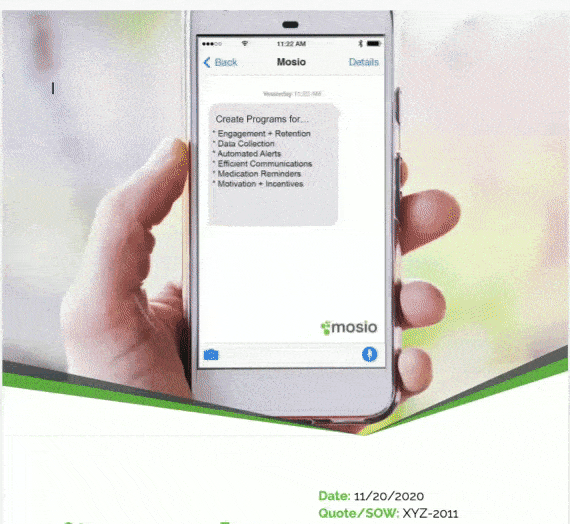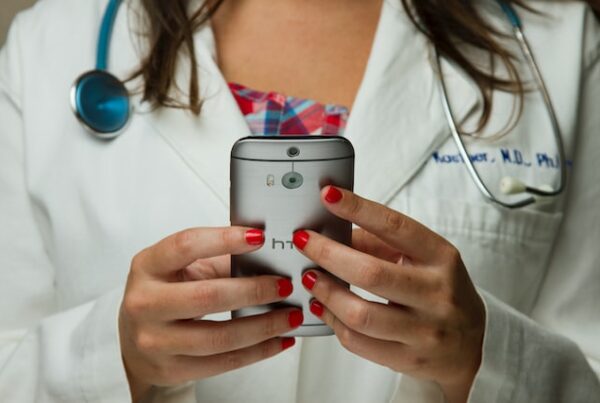We’ve compiled a list of 10 mHealth studies below, including text messaging support for maternal obesity services, improved adherence and outcomes for pediatric liver transplant recipients, early infant diagnosis of HIV infection in Zambia through mobile phone texting of blood result to name a few. All studies listed below have links to their respective findings and papers.
If you are conducting a research study and have any questions about how text messaging can help you improve in patient recruiting, program reminders and data collection, please visit our text messaging for research services page or call Gabriel Macias: 877.677.4699 Ext. 703.
List of mHealth Studies, Publications, and Papers:
Background:
Mobile (cell) phone communication has been suggested as a method to improve delivery of mHealth services. However, data on the effects of mobile health technology on patient outcomes in resource-limited settings are limited. We aimed to assess whether mobile phone communication between health-care workers and patients starting antiretroviral therapy in Kenya improved drug adherence and suppression of plasma HIV-1 RNA load.
Dr Richard T Lester MD a b c , Paul Ritvo PhD d, Edward J Mills PhD e, Antony Kariri BSc a, Sarah Karanja BSc a, Michael H Chung MD f, William Jack DPhil g, James Habyarimana PhD h, Mohsen Sadatsafavi MD i, Mehdi Najafzadeh MSc i, Carlo A MarraPharmD i, Benson Estambale MBChB j, Elizabeth Ngugi PhD a, T Blake Ball PhD b, Lehana Thabane PhD k, Lawrence J Gelmon MD ab, Joshua Kimani MBChB a b, Marta Ackers MD l, Prof Francis A Plummer MD b m
a Department of Medical Microbiology, University of Nairobi, Nairobi, Kenya
b Department of Medical Microbiology, University of Manitoba, Health Sciences Centre, Winnipeg, MB, Canada
c Division of Infectious Diseases, Department of Medicine, University of British Columbia, Vancouver, BC, Canada
d School of Kinesiology and Health Sciences, Department of Psychology, York University, York, ON, Canada
e Faculty of Health Sciences, University of Ottawa, Ottawa, ON, Canada
f Department of Global Health, University of Washington, Seattle, WA, USA
g Department of Economics, Georgetown University, Washington, DC, USA
h Georgetown Public Policy Institute, Georgetown University, Washington, DC, USA
i Collaboration for Outcome Research and Evaluation, Faculty of Pharmaceutical Sciences, University of British Columbia, Vancouver, BC, Canada
j University of Nairobi Institute of Tropical and Infectious Diseases, Nairobi, Kenya
k Department of Clinical Epidemiology and Biostatistics, McMaster University, Hamilton, ON, Canada
l Global AIDS Program, US Centers for Disease Control and Prevention, Nairobi, Kenya
m National Microbiology Laboratory, Public Health Agency of Canada, Winnipeg, MB, Canada
Correspondence to: Dr Richard T Lester, British Columbia Centre for Disease Control, 655 West 12th Avenue, Vancouver, BC, V5Z 4R4, Canada
Published Online: 10 November 2010
_____________________________________________________________
Abstract:
Poor adherence to highly active antiretroviral therapy (HAART) is a major hindrance to the reduction of mortality and morbidity due to HIV. This qualitative study used focus groups to explore the views and experiences of HIV patients on HAART with adherence reminders, especially the text message (SMS [short message service]).
Lawrence Mbuagbaw1,2, Renée Cécile Bonono-Momnougui1, Lehana Thabane2,3
1Centre for the Development of Best Practices in Health (CDBPH), Yaoundé Central Hospital, Yaoundé, Cameroon; 2Department of Clinical Epidemiology and Biostatistics, McMaster University, Hamilton, Ontario, Canada;3Biostatistics Unit, Father Sean O’Sullivan Research Centre, St Joseph’s Healthcare, Hamilton, Ontario, Canada
Published: April 2012
_____________________________________________________________
Abstract:
This study was aimed to explore women’s and midwives’ views on the use of mobile health technology in supporting obese pregnant women with healthy lifestyle choices.
H. Soltani,1 P. J. Furness,2 M. A. Arden,2 K. McSeveny,3 C. Garland,4 H. Sustar,5 and A. Dearden3
1Health and Social Care Research Centre, Sheffield Hallam University, 32 Collegiate Crescent, Sheffield S10 2BP, UK
2Department of Psychology, Sociology & Politics, Sheffield Hallam University, Collegiate Crescent, Sheffield S10 2BP, UK
3Communication and Computing Research Centre, Sheffield Hallam University, Cantor Building, 153 Arundel Street, Sheffield S1 2NU, UK
4Maternal Obesity Clinic, Doncaster and Bassetlaw Hospitals NHS Foundation Trust, Armthorpe Road, Doncaster, DN2 5LT, UK
5Sheffield Hallam University, Cantor Building, 153 Arundel Street, Sheffield S1 2NU, UK
Correspondence should be addressed to H. Soltani, [email protected]
Received 9 March 2012; Revised 21 May 2012; Accepted 27 May 2012
Published: 2012
_____________________________________________________________
4) Early infant diagnosis of HIV infection in Zambia through mobile phone texting of blood test results
Objective:
To see if, in the diagnosis of infant infection with human immunodeficiency virus (HIV) in Zambia, turnaround times could be reduced by using an mHealth automated notification system based on mobile phone texting.
Phil Seidenberg a, Stephen Nicholson b, Merrick Schaefer c, Katherine Semrau a, Maximillian Bweupe d, Noel Masese d, Rachael Bonawitz e, Lastone Chitembo c, Caitlin Goggin b & Donald M Thea a
a. Center for Global Health and Development, Boston University, 801 Massachusetts Avenue, Boston, MA 02118, United States of America (USA).
b. Zambia Center for Applied Health Research and Development, Lusaka, Zambia.
c. United Nations Children’s Fund Zambia, Lusaka, Zambia.
d.Zambian Ministry of Health, Lusaka, Zambia.
e.Department of Pediatrics, Boston Medical Center, Boston, USA.
Correspondence to Donald M Thea (e-mail: [email protected]).
Published: 2012 May (WHO Bulletin)
_____________________________________________________________
5) Internet and Mobile Technology Use Among Urban African American Parents
Background:
There is considerable potential for mobile technologies to empower pediatric patients and families, in particular by improving their communication with health professionals. While mHealth technology seems poised to transform healthcare communication, its efficacy in minority populations in unclear.
Ivor Braden Horn*, Children’s National Medical Center, Washington, DC, United States
Stephanie J Mitchell, Children’s National Medical Center, Washington, DC, United States
Published: 2012-08-22
_____________________________________________________________
BACKGROUND:
As in other countries worldwide, the prevalence of mental disorders in Germany is high. Although numerically a dense network of in- and outpatient psychiatric health services exists, the availability in rural and remote regions is insufficient. In rural regions, telemedical and mHealth concepts can be a chance to unburden and complement the existing healthcare system.
van den Berg N, Grabe HJ, Freyberger HJ, Hoffmann W
Institute for Community Medicine University of Greifswald Ellernholzstr, 1/2 17487 Greifswald, Germany. [email protected]
Published: 17 February 2011
_____________________________________________________________
Objective:
This mHealth paper first illustrates the general potential of the short message service (SMS) for symptom and behavior monitoring and the provision of tailored feedback. Second, an SMS-based maintenance treatment (SMSMT) is introduced and aimed at enhancing the treatment of childhood overweight.
1Stephanie Bauer, 2 Judith de Niet, 2Reinier Timman, 3Hans Kordy
1University Hospital Heidelberg, Germany
Corresponding author at: Center for Psychotherapy Research, University Hospital Heidelberg, Bergheimerstr. 54, 69115 Heidelberg, Germany. Tel.: +49 6221 567612; fax: +49 6221 567350.
2Department of Medical Psychology and Psychotherapy, Erasmus University Medical Centre, Rotterdam, The Netherlands
3University Hospital Heidelberg, Germany
Published online: 26 April 2010
_____________________________________________________________
8) Improved Adherence and Outcomes for Pediatric Liver Transplant Recipients by Using Text Messaging
OBJECTIVE:
The goal was to improve immunosuppressant adherence for pediatric patients with orthotopic liver transplants by using text messaging (TM).
Tamir Miloh, MDa,b, Rachel Annunziato, PhDa,b,c, Ronen Arnon, MDa,b, Jill Warshaw, NPa,b, Sanobar Parkar, MD, MPHa,b, Frederick J. Suchy, MDa,b, Kishore Iyer, MDa,b, Nanda Kerkar, MDa,b
aDepartment of Pediatrics
bRecanati Miller Transplant Institute, Mount Sinai Hospital, New York, New York
cDepartment of Psychology, Fordham University, Bronx, New York
Published online: October 12, 2009
_____________________________________________________________
Objective:
To evaluate targeted text message reminders for low-income, urban parents to promote receipt of influenza vaccination among children and adolescents.
Melissa S. Stockwell, MD, MPH; Elyse Olshen Kharbanda, MD, MPH; Raquel Andres Martinez, PhD; Celibell Y. Vargas, MD; David K. Vawdrey, PhD; Stewin Camargo, BS
Author Affiliations: Departments of Pediatrics (Drs Stockwell, Martinez, and Vargas and Mr Camargo), Biomedical Informatics (Dr Vawdrey), and Population and Family Health, Mailman School of Public Health (Drs Stockwell and Martinez), Columbia University, New York, New York; New York-Presbyterian Hospital, New York, New York (Drs Stockwell and Vawdrey); and HealthPartners Research Foundation, Minneapolis, Minnesota (Dr Kharbanda).
Published: April 25, 2012
_____________________________________________________________
10) Harm Reduction Text Messages Delivered During Alcohol Drinking: Feasibility Study Protocol
Background:
Recent research using mobile phone interventions to address public health issues such as smoking, obesity, depression, and diabetes provides a basis for trialing a similar approach toward reducing the negative consequences of risky drinking.
Karen Adell Renner1, BA, MA; Natalie Walker2*; Varsha Parag2*; Ross McCormick1*
1General Practice and Primary Health Care, School of Population Health, University of Auckland, Auckland, New Zealand
2Clinical Trials Research Unit, School of Population Health, University of Auckland, Auckland, New Zealand
*these authors contributed equally
Corresponding Author:
Karen Adell Renner, BA, MA
General Practice and Primary Health Care
School of Population Health
University of Auckland
Bldg 730
261 Morrin Road, Glen Innes
Auckland,
New Zealand
Phone: 64 21440501
Fax: 64 94157182
Email: k.renner [at] auckland.ac.nz
Published: 23.05.12
______________________________________________________
Compiled by Mosio mobile messaging software. All copyright belongs to original owners.
Want to learn more? Join the Patient Recruitment and Retention (PR+R) Group on LinkedIn!
Get a quote for Mosio’s patient engagement solutions.








